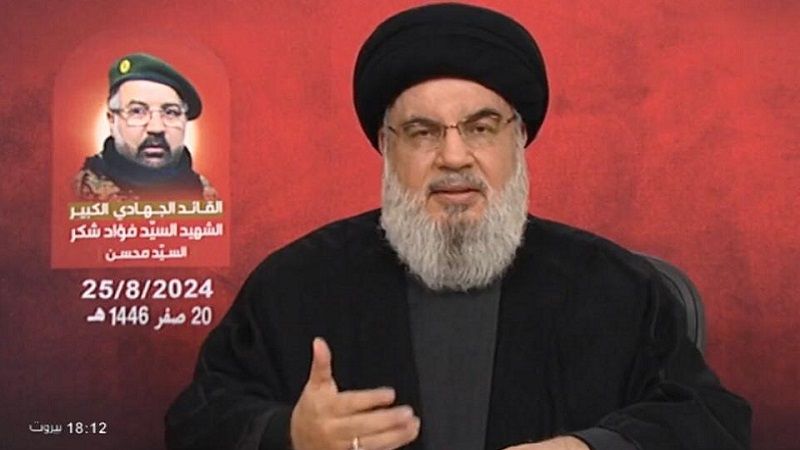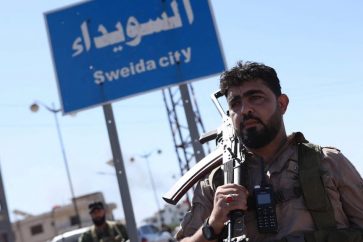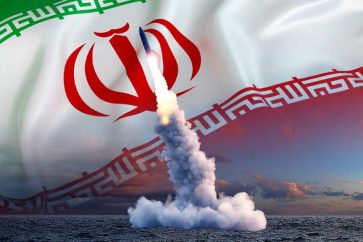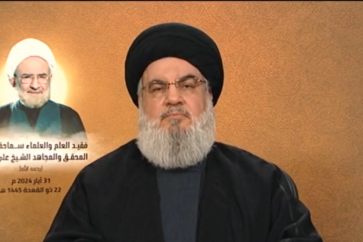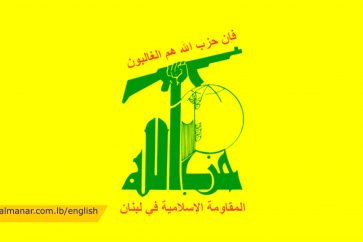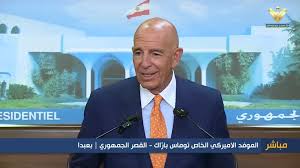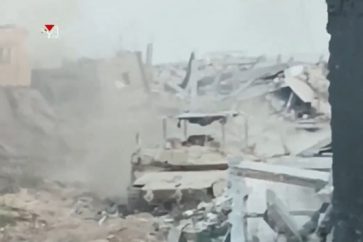Hezbollah Secretary General Sayyed Hasan Nasrallah revealed on Sunday details of the resistance’s recent powerful operation, warning that they will evaluate the Israeli concealment of today’s events, considering the response complete if satisfactory; otherwise, Hezbollah reserves the right to respond later.
In a powerful speech which was announced to be delivered only Sunday morning in Hezbollah’s statement, Sayyed Nasrallah emphasized the resistance’s determination to respond to the aggression on the southern suburbs of Beirut and the martyrdom of Military Commander Sayyed Fuad Shokr and several civilians, highlighting that the resistance had been prepared to respond from the first day of Sayyed Mohsen’s martyrdom, noting that the response is an integral part of the punishment.
His eminence explained that the resistance needed time to evaluate whether the response should be coordinated across the entire axis or handled by individual fronts. They also waited to allow negotiations a chance, aiming to halt the aggression against Gaza. He pointed out that the negotiations have been protracted, with [Israeli Prime Minister Benjamin] Netanyahu imposing new conditions on the resistance in Gaza.
“The delay in the operation was caused by American and Israeli mobilization, and this delay also served as a form of punishment for the enemy. We delayed our response to allow sufficient time for the ongoing negotiations concerning Gaza,” Sayyed Nasrallah said.
Announcing the name of the large-scale military operation as “Operation Arbaeen Day” to commemorate its occurrence on this significant day, which holds profound historical importance, Sayyed Nasrallah outlined the criteria for the response, stating that it should not target civilians or infrastructure but rather focus on military targets related to the assassination operation, such as intelligence bases or air force facilities. Targets were to be situated very close to Tel Aviv.
“We established guidelines for our response, ensuring that targets would not be civilians or enemy infrastructure, but rather military sites directly linked to the assassination operation.”
Among the identified targets was the “Galilot” base, a central intelligence base housing Unit 8200, located 110 kilometers from the Lebanese border and only 1,500 meters from Tel Aviv. “We have identified the “Galilot” base as a primary target for Operation Arbaeen Day. This base houses Unit 8200, which specializes in intelligence gathering, eavesdropping, and espionage. It is situated 110 kilometers from the Lebanese border and just 1,500 meters from the border of Tel Aviv,” the S.G. pointed.
The “Ein Shemya” base, 75 kilometers from Lebanon and 40 kilometers from Tel Aviv, was also within the targeting circle, he said. The resistance planned to launch 300 Katyusha rockets and targeted drone sites to exhaust the Iron Dome and interceptor missiles, allowing drones to cross their intended targets, he explained further.
“The plan was to launch 300 Katyusha rockets and disperse them across various sites. This number was deemed sufficient to overwhelm the Iron Dome and its interceptor missiles for several minutes, allowing the drones to proceed,” Sayyed Nasrallah said, adding: “No resistance platforms were hit before the operation began. The resistance successfully launched 340 missiles, and all drone sites deployed their drones despite the raids. Remarkably, no site was damaged, either before or after the operation.”
Sayyed Nasrallah disclosed that the operation was scheduled for the Arbaeen of Imam Hussein (PBUH) and commenced at 5:15 AM after the dawn prayer. This operation marked the first-time drones were launched from the Bekaa region, successfully crossing the occupied Palestinian borders despite the long distance, he said.
“Our data suggests that a substantial number of drones successfully reached the two specified targets; however, as usual, the enemy is keeping this information confidential,” Hezbollah’s leader identified.
His eminence confirmed that no launch pads or drone sites were hit before or after the operation. He highlighted the primary targets: the “Aman” military intelligence base and the “8200” unit in Galilot, as well as the air defense base in Ein Shemya. He noted that a significant number of drones reached these targets, though the enemy is keeping this information secret. Despite launching 340 missiles, the enemy did not manage to thwart the operation. “If there were any casualties in Nahariya, Acre, or other locations, they were caused by Israeli interceptor missiles,” he further added.
Criticizing the Zionist narrative about the event, Sayyed Nasrallah described it as full of lies that reflect the entity’s weakness. “The enemy’s claim that it targeted ballistic missiles prepared to strike Tel Aviv is false,” he said. He also clarified that Hezbollah’s strategic and precision missiles were not used in this operation but remain intact, as the valleys thought to contain missile platforms had been evacuated previously.
“‘Israel’ falsely claimed to have destroyed our strategic missiles, despite knowing that we have not used them yet and may do so in the future,” the secretary general said, further stating that Hezbollah’s fighters had already evacuated all the valleys containing precision and ballistic missiles, so what the enemy bombed today were empty valleys. “The drone sites were not hit, and the missile launch pads fired their missiles without being damaged in the pre-raids,” he indicated.
Sayyed Nasrallah further noted that the enemy began raids half an hour before the operation due to the movement of the Mujahideen, not from intelligence information. “The enemy initiated the raids half an hour before the resistance operation, sensing the movement of the Mujahideen rather than acting based on intelligence information.”
He characterized the enemy’s actions as an intelligence failure and a failure in preemptive operations. “The enemy is claiming hundreds of raids, but in reality, they only hit two missile launch pads. What occurred was an act of aggression, not a preemptive action, and it had no impact on our operation today or on our Mujahideen.”
“We are confronted with an Israeli narrative filled with falsehoods and intelligence failures; in contrast, our military operation was executed exactly as planned, despite all the challenging circumstances,” he said.
Sayyed Nasrallah praised the resistance for its courage in carrying out the operation, despite the enemy’s efforts to shut down Tel Aviv and its airports. He stated that this was the first major operation undertaken without the late Sayyed Fouad, emphasizing that it was executed flawlessly. “This is the first major operation the resistance has undertaken without a great leader like Sayyed Fuad Shokr, yet we believe that the spirits of our martyred leaders are with us, supporting and guiding us.”
The response has set a new equation, demonstrating that the resistance remains formidable. “Today, we witnessed a scene that vividly demonstrates the courage of the resistance and its supporters, who acted boldly despite all the American and Western intimidation,” he said.
“We disrupted the Israeli entity with Katyusha rockets; imagine the impact if we had launched even other rockets,” Sayyed Nasrallah went on to say in his today’s powerful speech.
On the impact of today’s retaliation to the Israeli assassination of Sayyed Fuad Shokr, Sayyed Nasrallah threatened: “We will assess the outcome of the Israeli concealment of today’s events; if the result is satisfactory, we will consider the response process complete, if it falls short, we will reserve the right to respond at a later time.”
“At this stage, Lebanon can rest assured, as the enemy has announced that today’s events are concluded,” he said.
Looking ahead, Sayyed Nasrallah outlined the next stages of the operation, including further targeting and evaluating the results of the enemy’s concealment of the events. He assured continued support for Gaza and Palestine, regardless of the challenges and sacrifices. “Any hopes of silencing the support fronts, especially the Lebanese front, will fail; we will continue to support Gaza, regardless of the sacrifices involved.”
The charismatic leader ended his historic speech with a warning to the Israeli enemy: “The enemy must understand and be very cautious about the nature of Lebanon and the strategic changes occurring. Lebanon is no longer weak and can no longer be subdued easily, there may come a day when we invade you with a musical band!” Referring to a famous statement in the 1970s by Israeli military leader Moshe Dayan, who said then that the musical band in the Israeli army can invade and occupy Lebanon.
Sayyed Nasrallah began his speech by expressing gratitude to the Iraqi government and people for their hospitality during the Arbaeen of Imam Hussein (PBUH), acknowledging their generosity. He also extended condolences to the Lebanese people on the passing of Prime Minister Salim al-Hoss, recognizing him as a symbol of resistance and patriotism. He also thanked the resistance fighters for their steadfastness and dedication.
Early Sunday, the Islamic Resistance in Lebanon announced its initial response to the martyrdom of the esteemed jihadi leader Sayyed Fuad Shokr, who was targeted by Israeli occupation aircraft on Tuesday, August 30, 2024. The attacks also resulted in the deaths of several civilians, including women and children.
Source: Al-Manar English Website

